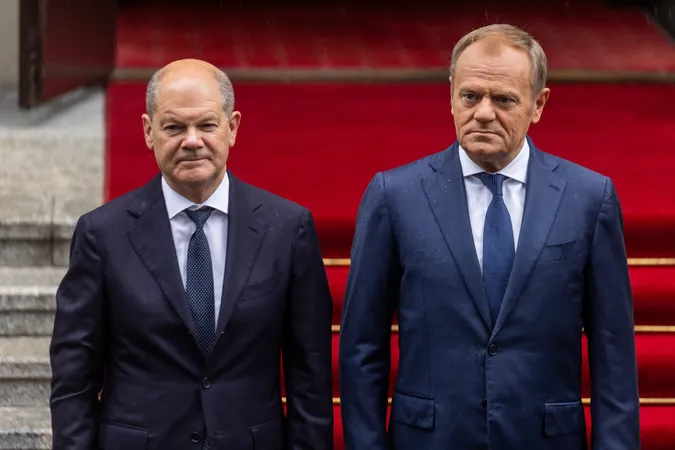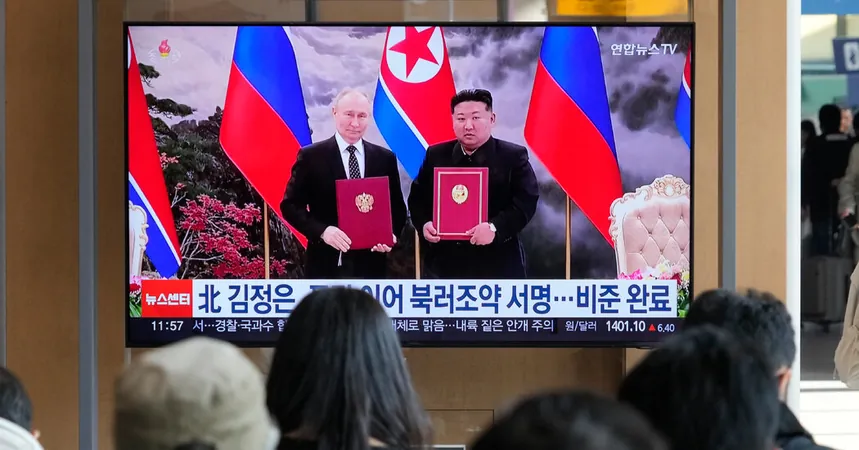
NATO Allies Outraged Over Putin's Recent Dialogue with Germany Amid Escalating Attacks on Ukraine
2024-11-17
Author: Ting
Tensions Rise in NATO
Tensions are escalating within NATO as Poland's leaders express their dissatisfaction with German Chancellor Olaf Scholz's recent phone call with Russian President Vladimir Putin. This conversation, which marked the first direct communication between the two leaders in nearly two years, has triggered heightened criticism from NATO ally Poland, emphasizing that mere "telephone diplomacy" is insufficient in the face of ongoing aggression towards Ukraine.
Poland's Reaction
Polish Prime Minister Donald Tusk voiced his concerns on social media, stating, "No one will stop Putin with phone calls." He highlighted the urgency of real support for Ukraine following a devastating missile and drone assault launched by Moscow that targeted critical energy infrastructure in Ukraine. President Volodymyr Zelensky reported that approximately 120 missiles and 90 drones were unleashed in what has been described as one of the most significant attacks in the ongoing war. Thankfully, Ukrainian defenses managed to intercept over 140 of these aerial threats.
Scholz's Call to Putin
This dramatic uptick in hostilities coincided with Scholz's call to Putin, during which the German Chancellor urged the Russian leader to end hostilities and withdraw troops from Ukraine. Scholz's call came amidst political uncertainty in Germany, with a snap election looming following the disintegration of the current governing coalition.
Concerns from Lithuania
Lithuanian Foreign Minister Gabrielius Landsbergis also weighed in, declaring that "true peace can only be achieved through strength" and condemning the strategy of negotiating with what he termed a "genocidal dictator." There are growing concerns regarding how the situation may evolve with Donald Trump poised for a potential deal with Putin following his upcoming inauguration as President of the United States. Reports have suggested a demilitarized zone along the front lines could solidify Russia's hold on contested territories, raising alarms among Eastern European nations and Ukraine itself.
Zelensky's Warning
Zelensky warned that Scholz's engagement with Putin resembled "opening Pandora's box," indicating that further discussions may dilute the urgency needed to address the conflict effectively. The Kremlin has indicated that any future negotiations will consider "new territorial realities," a signal that Russia may not be inclined to retreat from its current territorial ambitions.
Growing Alliances
As the conflict drags on, Moscow has increasingly aligned itself with countries like China, North Korea, and Iran, reinforcing the notion that diplomacy with Russia is fraught with complications. Scholz reminded the public that international support for Ukraine remains critical, noting, "He [Putin] cannot count on waning support from Germany, Europe, and many others around the world."
Looking Ahead
The dynamics of this conflict continue to unfold, with the coming weeks potentially serving as a decisive period not only for Ukraine but also for the broader geopolitical landscape. Can NATO allies rally to provide the support Ukraine desperately needs, or will dialogue prove insufficient in the face of ongoing aggression? Stay tuned as this story develops.





 Brasil (PT)
Brasil (PT)
 Canada (EN)
Canada (EN)
 Chile (ES)
Chile (ES)
 España (ES)
España (ES)
 France (FR)
France (FR)
 Hong Kong (EN)
Hong Kong (EN)
 Italia (IT)
Italia (IT)
 日本 (JA)
日本 (JA)
 Magyarország (HU)
Magyarország (HU)
 Norge (NO)
Norge (NO)
 Polska (PL)
Polska (PL)
 Schweiz (DE)
Schweiz (DE)
 Singapore (EN)
Singapore (EN)
 Sverige (SV)
Sverige (SV)
 Suomi (FI)
Suomi (FI)
 Türkiye (TR)
Türkiye (TR)